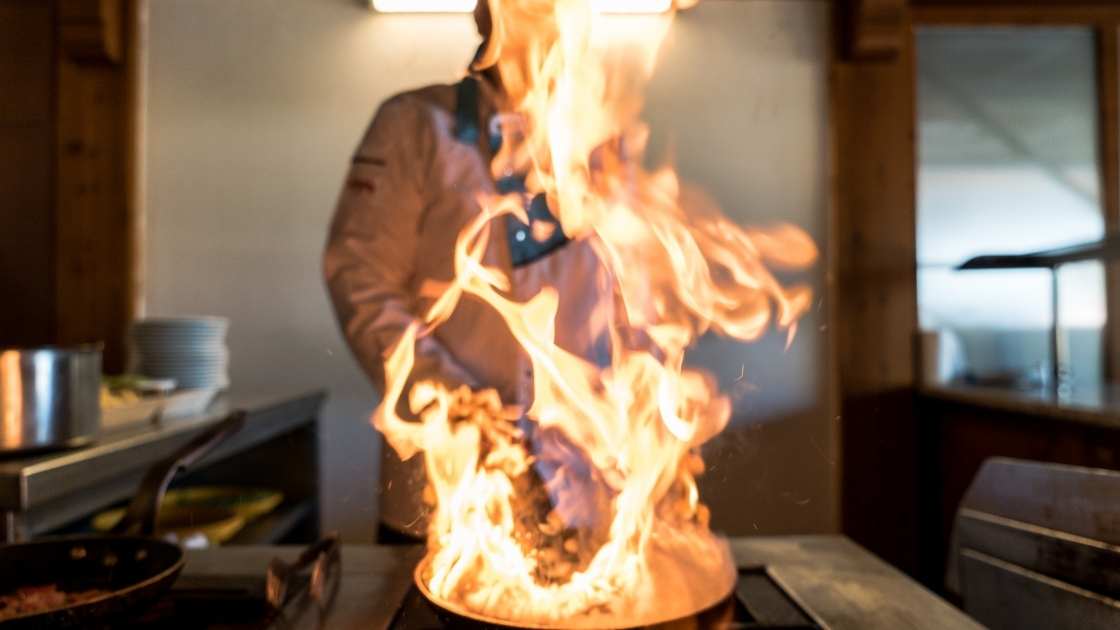As a restaurant owner, you know that you must follow strict sanitary protocols and proper food disposal. This is common knowledge and second nature.
However, you may not be as familiar with cleaning the grease trap.
Grease buildup can cause health issues in customers and employees, and it can also have financial consequences. Even worse, a dirty grease trap can cause a kitchen fire! This can cause serious damage to the restaurant and it can create a dangerous environment for everyone in the restaurant.
In this post, we will explain how to avoid a kitchen fire due to a dirty grease trap and outline how to be prepared if a fire does occur.
How Does a Dirty Grease Trap Become Dangerous?
A dirty grease trap can create foul smells and plumbing issues. And, if it gets very bad, the restaurant may need to close for maintenance. Not to mention, you can also be charged with a stiff fine for being negligent.
Customers can also suffer when the water source gets contaminated from the grease trap blockage. Washing the dishes with this polluted water can spread toxins.
In the worst case, a dirty grease trap can start a kitchen fire.

Fire Prevention by Maintenance and Staff Training
Restaurant kitchen fires can be quite common considering the equipment found in the vicinity.
There are regular open flames, hot machines, cooking oils and cleaning chemicals all contained in one space. In fact, according to a study, kitchen fires are reported every year and a whooping 8,000 food and beverage establishments experience them.
As an entrepreneur, a fire can have a critical effect on your income as the losses can be so substantial that continuing to operate may out of the question.
To prevent restaurant kitchen fires, two things you can do is conduct preventative maintenance and train your staff well.
Let’s look at these in more detail:
1. Preventive Maintenance
One way to prevent a fire is by following a strict maintenance program. Consider implementing the following:
- Set up an automatic fire-suppression system in your restaurant kitchen. This can greatly reduce fires as it pours chemicals that extinguishes the flames. It also performs an automatic shut down of the electric supply located near the cooking machine. To ensure it’s functioning well, schedule an inspection twice a year.
- Double check cords and wiring and schedule constant maintenance on electrical equipment. Ensure there are no broken switch plates or highly flammable items located close to power sources.
- Schedule for regular monthly inspections of the exhaust system to eliminate grease buildup.
- Ensure that portable fire extinguishers are available. Make sure that you have the right type to tackle specific fire categories.

2. Staff Training
Ensure that your staff is adequately trained!
Make sure they can:
- Immediately locate a fire extinguisher and know how to use it. You can teach them to remember the acronym PAST. It stands for pulling the pin, aiming for the base, sweeping movement and ten feet of distance for self-protection.
- Wipe off the grease and deep clean exhaust hoods. Air flow must be unrestricted by attending to the grease buildup. Mind the walls and ensure they’re clean as well. Moreover, don’t forget to focus on work surfaces, broilers, grills, fryers, ovens, vents and filters.
- Avoid putting out the grease fire using water. You want to keep the fire from spreading and not fan it larger becoming more uncontrollable.
- Get rid of ashes from your wood-burning or charcoal ovens. Place them in metal storage for a good 10 feet of distance from any establishment or inflammable materials.
- Ensure cigarettes are put out before collecting them in a garbage bin. Smoking must be discouraged near storage facilities.
- Properly store flammable liquids. It’s advisable to keep them in their original packaging since these containers are designed to hold and seal them well. Make sure that these containers are set in areas where the air circulates. Lastly, they should be placed far from food and supplies.
- Clean up and keep flammable items stored in proper places where the heat source is situated far away. Flammable items can refer to paper, boxes, linens and food. Practice the right protocol of throwing away soiled rags, trash, and unnecessary boxes at a minimum of once per day.
- Use chemical solutions properly. Instructions must be followed, and they must be used where there’s good ventilation. If there are chemical spills, they must be cleaned up quickly.
Preparation Through an Emergency Plan
The best way to handle a fire crisis is to have a contingency plan. Rehearse on how to handle a fire situation. Display how to perform crowd control and how to direct the customers to a safe area.
- Conduct a one-on-one training and teach the staff to switch off the gas and electrical power so panic will be reduced during an emergency.
- Create an evacuation plan and train staff to lead the evacuation and follow a safety protocol. Instruct them to call 911, assess the need for an evacuation and escort people to restaurant exits properly. Each staff member must know where the exits are located in any area of the restaurant.
- Teach emergency training and utilize the equipment designed for fire-safety. Stage demos on evacuation procedures and frequently conduct training to refresh everyone’s memory.

Bottom Line
As you can see, not only can grease buildup have financial and health consequences, but it can also cause a kitchen fire – which would cause damages and a dangerous environment for staff and customers.
At Greasecycle, we want you to avoid that stress. We offer a professional grease trap pumping and cleaning. We also perform oil recycling, grease trap waste processing and preventative drain jetting services.
Contact our team of experts today for more infomation at (919) 817-6792. We’re ready to serve you!